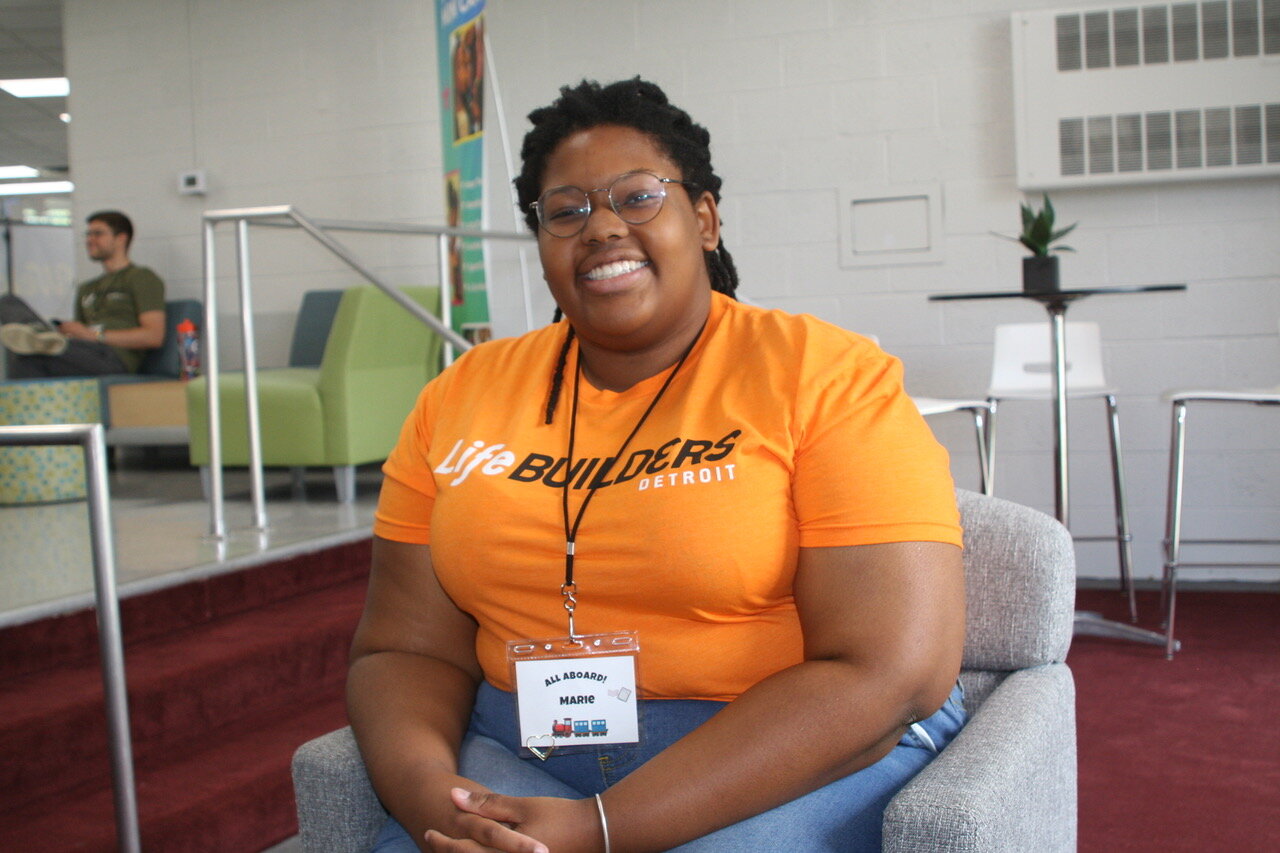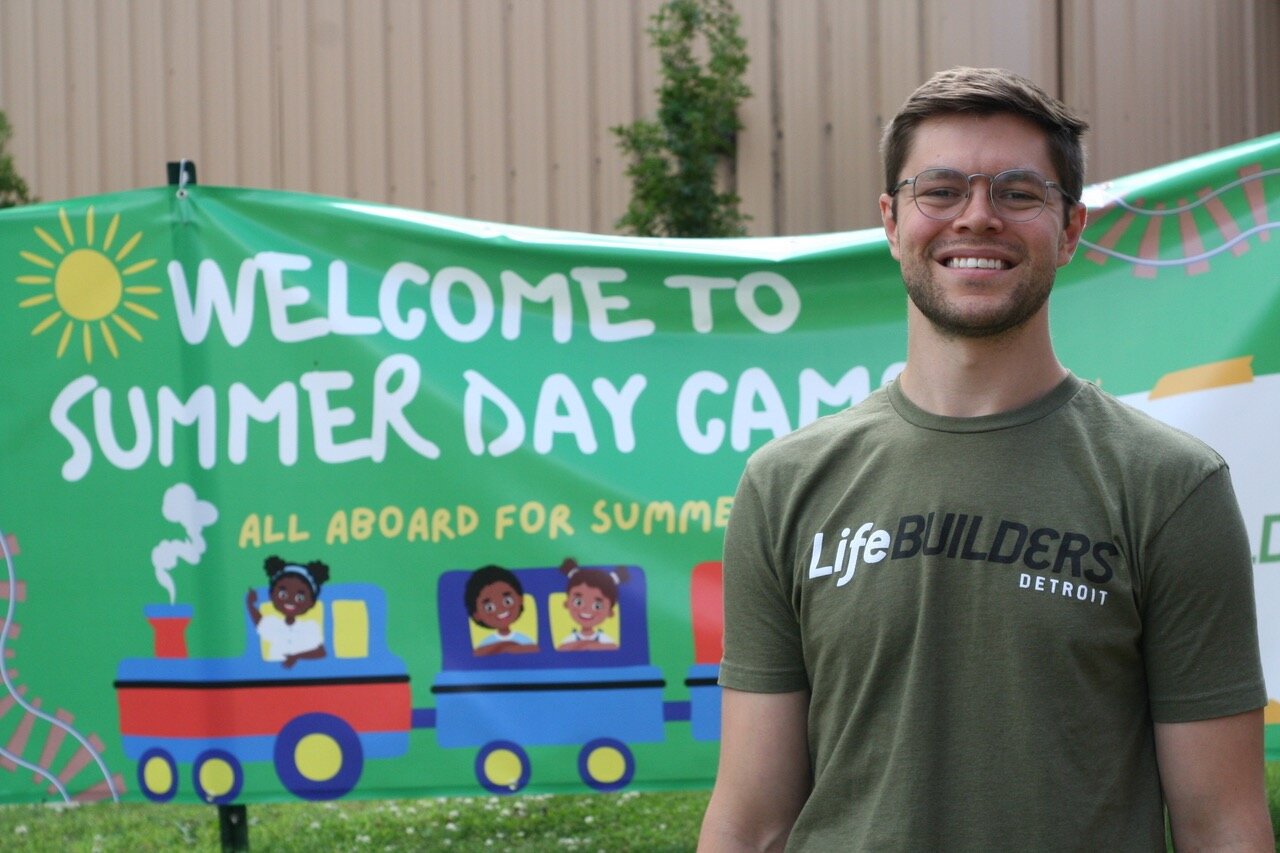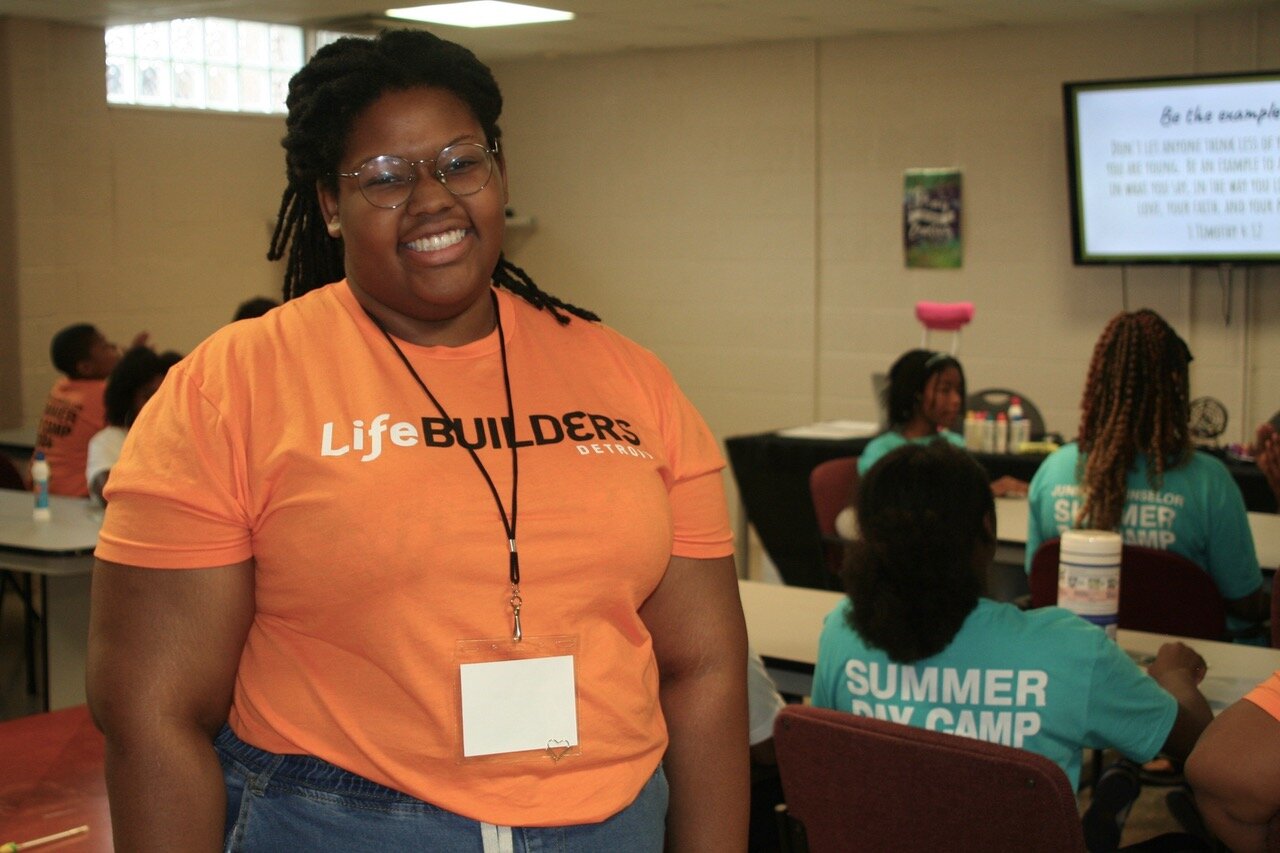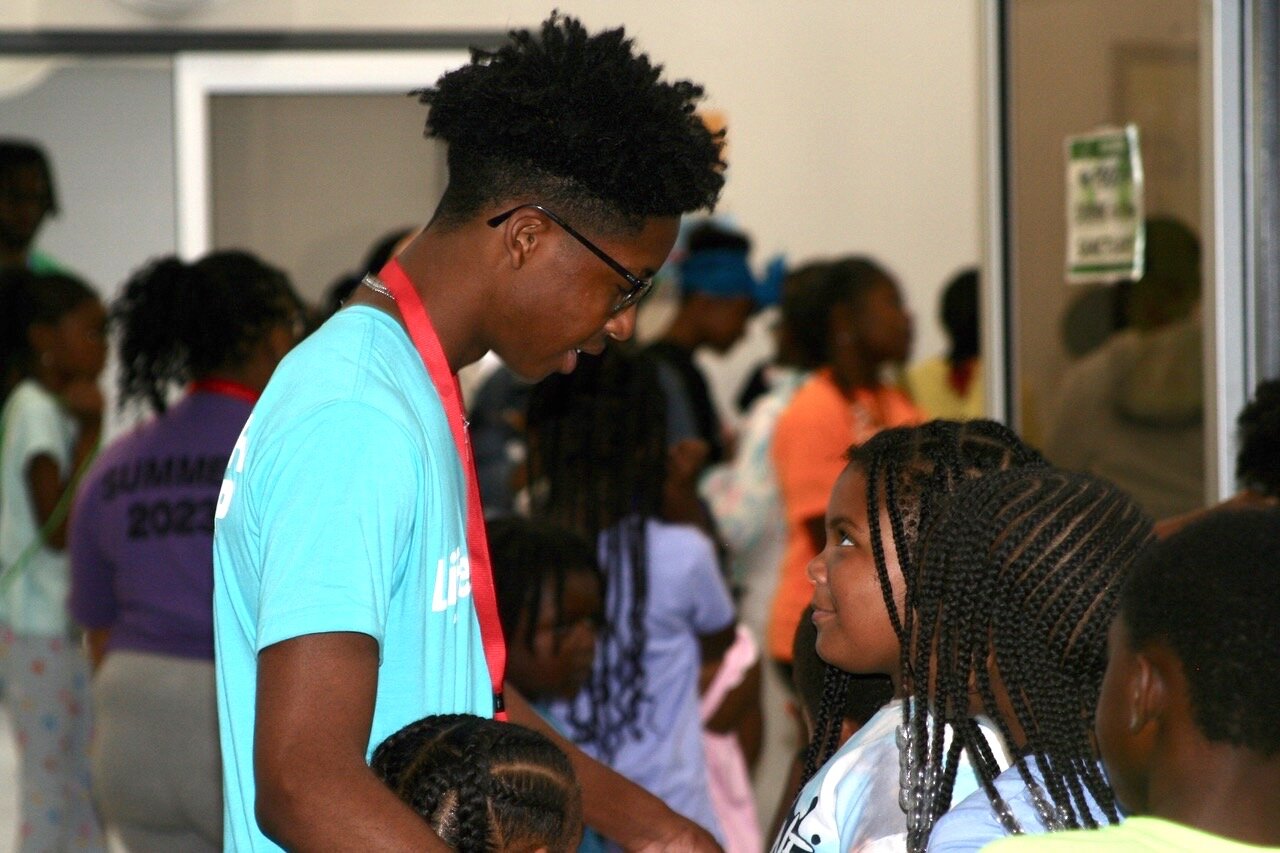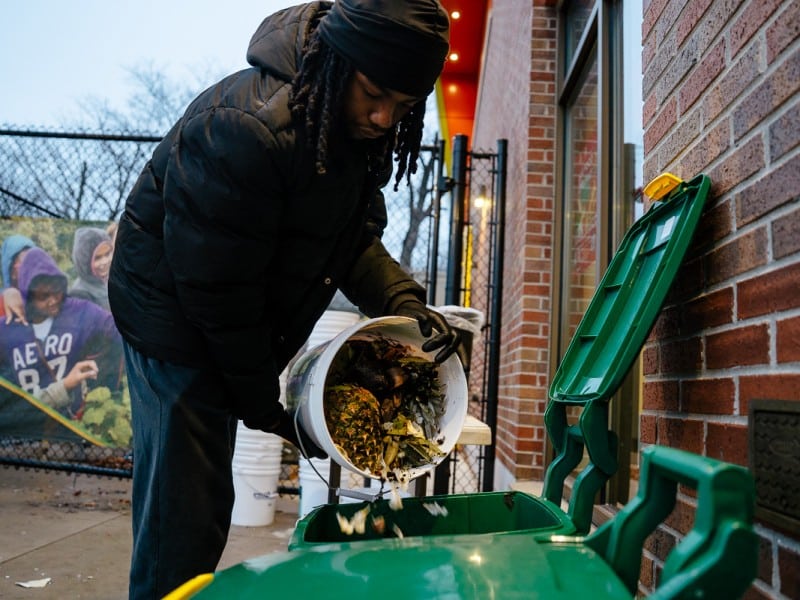Northeast Detroit teens essential to summer day camp success
A positive work environment brings out the best in summer youth employees who help deliver a fun day camp experience to more than 100 children on Detroit’s northeast side.
Twenty-four motivated teens, ages 14-19, are working hard this summer as youth employees at LifeBUILDERS Summer Day Camp.
These brave young souls work with the 100+ children in attendance on any given day. They help with lessons and activities, prepare for lunch, cajole campers to move to their next activity – and make sure even the most hesitant or shy child feels loved and included.
“It’s ultimately about inspiring the kids,” says Jimmie Smith, 16, who is spending his third summer as a youth employee. “They’re pretty much the whole point of this. A main part of our work is having fun with them, whether it’s being part of the lesson or playing gym games or crafts or Legos with them.”
Smith says he’s learned a lot over the years: how to interact with coworkers and little kids, manage different circumstances and approach situations with sensitivity.
“You don’t want to make a kid sad or cry or come off wrong with any of the staff members, especially dealing with kids because they’re a lot more emotional. They don’t fully understand,” he says.
Smith knows because he was once a LifeBUILDERS camper himself, as was summer youth employee Marie Winston-Turner, also 16.
She says the experience working at the camp has made her a better problem solver. She has mastered handling problematic situations in the moment if an adult leader isn’t available.
“I’ve learned how to be calm because sometimes kids, and adults, can be very sporadic and uncontrollable, and if you yell and be loud with them, they’re just going to match you. You learn to take a deep breath and talk, completely calm, not aggressively, because that won’t get your point across.”
Winston-Turner says her confidence has grown through working at the camp, and she’s conscious of being a role model to the children. “If I give it my all, then we have a kid here giving it their all.”
Her communication skills have also blossomed, having learned how to appropriately talk with her peers, parents, and people with more responsibility than her. In doing that she says she feels like she has tapped into the business community by working at LifeBUILDERS camp. “But it’s also a family,” she says. “I could just call them, text them, be like, ‘Hey guys, let’s go hang out.’ I’ve definitely grown with them a lot.”
Winston-Turner and Smith earn $13 an hour because they are experienced, high-performing summer youth employees. Most teens earn $11.25 an hour, says Noah Stricker, deputy director at LifeBUILDERS. The program allows teens to work no more than 20 hours a week, and most do that over a three-day period. Some teens, like Smith, need volunteer hours for school, so they put in more time unpaid.
Stricker says the teens are essential to camp operations. “We’re a pretty small team here at LifeBUILDERS, so to have a summer day camp with over 100 kids really requires that we have extra support,” says Stricker. “Our teens are a huge part of being the eyes and the ears of what’s going on with our kids. Our kids look up to the teens in a way that they don’t look up to adults; they’re watching them.”
“They’re a great example to our younger children of professionalism and carrying themselves with maturity and not acting out. They can pour into our kids in a way that our adults can’t, in a big brother, big sister type of way,” Stricker says.
LifeBUILDERS summer day camp serves children of Regent Park in northeast Detroit. The neighborhood is bounded by Seven Mile Road and Eight Mile Road to the south and north and Kelly Road and Gratiot Ave. to the east and west.
After camp concludes, the teens spend the second part of the summer doing blight removal and community cleanup in the neighborhood. They’ll help beautify senior citizen homes, homes of people who aren’t able to maintain their own properties, parks and other public spaces.
“There’s so much work still to do here [in Regent Park],” says Stricker. “We have almost 10,000 residents in our little neighborhood of Detroit, and we’re trying to go deep with those ones.” While LifeBUILDERS won’t turn away people for services from other neighborhoods, its focus is Regent Park.
Stricker says the neighborhood has a long, rich history. “It’s been an incredible miracle to see it be on the rise as of late,” he says. “This neighborhood has bounced back really well from financial crisis crash and a huge exodus of people moving out. That led to a lot of vacancy, burned out homes and crime. At this point, we’ve seen a huge improvement in the neighborhood.”
LifeBUILDERS itself has worked on more than 100 community homes and is deeply involved in housing development. It also offers programs for children, teens and seniors.
But during the summer, the agency is clearly focused on young people as its immense ministry center in Eastpointe (across the street from Regent Park) bustles with summer campers and the teens who serve them.
Stricker says that staff members remind the teens how essential and important they are to making summer fun for the children they serve.
For Smith and Winston-Turner, the work opportunity means another summer of meaningful employment versus hanging out at home or working at a fast food restaurant.
Smith says, if it weren’t for his job as a summer youth employee, he would probably be in his backyard playing basketball or at home or, if his parents allowed, maybe getting employment elsewhere.
Winston-Turner says, “If I didn’t have this job this summer, I probably would’ve been laying around doing nothing, visiting a college or two or multiple colleges maybe. But, yeah, really much of nothing.”
“Our youth crave encouragement. They’re looking for positivity. They want something real and tangible in their lives, and we’re here to try to offer that,” Stricker says. “The leadership here at LifeBUILDERS cares about our teens a ton, and that’s why we’re really prone to, once we hire someone, working with them and trying to do everything we can to make sure that they stick with us.”
Resilient Neighborhoods is a reporting and engagement series examining how Detroit residents and community development organizations work together to strengthen local neighborhoods. It’s made possible with funding from The Kresge Foundation.
